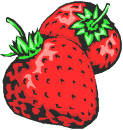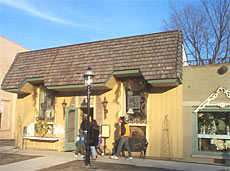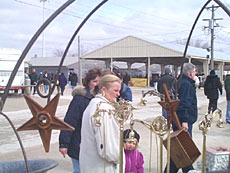|
Features,
Animals
for Adoption,
Out
and About,
Other
travel news, Other
home and garden news
|
|
Features
|
|
|
Asparagus
— the elegant
vegetable
 [APRIL
27, 2001]
Asparagus,
a member of the lily family, is an elegant vegetable included in many gourmet
menus. In ancient times, it was considered a luxury item, fit for a king. Today,
the cost may still seem lavish, but the scrumptious taste is worth every penny.
In our area, early spring is the season to enjoy locally grown asparagus, so
plan to include it in your meals. [APRIL
27, 2001]
Asparagus,
a member of the lily family, is an elegant vegetable included in many gourmet
menus. In ancient times, it was considered a luxury item, fit for a king. Today,
the cost may still seem lavish, but the scrumptious taste is worth every penny.
In our area, early spring is the season to enjoy locally grown asparagus, so
plan to include it in your meals.
|
|
The
greatest demand is for all-green asparagus, which is available
fresh, canned and frozen. White asparagus is found in some areas,
available fresh and canned. Some may grow a splendid, deep burgundy
spear that looks purple until cooked, when it turns green.

Nutritionwise,
asparagus is a good deal. One cup of raw asparagus has only 31
calories, 6 grams of carbohydrate, 3 milligrams of sodium, a trace
of fat and no cholesterol. Green asparagus is also a good source of
vitamin A.
When
buying fresh asparagus, select green, tender spears with dark green,
closed tips. Store asparagus upright so that only the cut ends are
in water. For best quality use within two to three days, changing
the water daily. Since asparagus deteriorates rapidly after picking,
it should be eaten, processed or refrigerated as soon as possible.
To
prepare the spears, break or cut off tough butts as far down as they
will snap easily. Wash thoroughly, leaving stalks whole, or break or
cut into pieces.
Asparagus
can be steamed, boiled, sautéed, stir-fried or microwaved. Cook
quickly and watch closely, as asparagus is done when it turns bright
green and is tender with a bit of crispness.
To
microwave, place 1 pound of spears in a two-quart, microwave-safe
baking dish. Add a couple teaspoons of water, cover and cook on high
for four to eight minutes, until tender-crisp. Let stand for a
couple more minutes before uncovering and serving.
[to top of second column in this
article]
|
The
list of seasonings and garnishes that complement the flavor of
asparagus is almost endless. Try with dill weed, chives, bacon or
bread crumbs. Or cheese, lemon butter, hollandaise sauce or pimento.
For the purist, toss freshly cooked asparagus with a teaspoon of
butter and sprinkle with a dash of salt. Enjoy!
Asparagus-Ham
Rollups
1
pound asparagus spears
2
tablespoons butter or margarine
2
tablespoons flour
¼
teaspoon salt
½
teaspoon dry mustard
1
cup milk
1
cup (4 ounces) sharp cheddar cheese, finely shredded
6
slices boiled ham, thinly sliced (about 6 ounces total)
Cook
asparagus until tender. Melt butter in heavy saucepan, stir in
flour, salt and mustard. Gradually stir in milk. Cook, stirring
constantly, until thickened. Add cheese and continue stirring until
cheese is melted. Be careful not to overcook. Divide asparagus into
six portions. Alternate direction of flower ends within each
portion. Place asparagus portions on and parallel to narrow end of
each ham slice, extending flower ends over edges of ham. Roll as for
jellyroll.
[Jananne
Finck, nutrition and wellness educator, University of Illinois
Extension, Springfield Center]

|
|
ILLINI
BANK
2201
Woodlawn Rd. in Lincoln
1-888-455-4641 or 735-5400
Ask for Terry Lock or Sharon Awe
Mortgage
Refinancing
Ag Lines of Credit
Low Auto Rates
Free Checking - Debit Card
Money Market Index Account |
The
Mustard Moon
1314
Fifth Street
Gifts ~
Dolls
Infant Clothes
Mention
ad
for 2 FREE votives |
Tell
a friend about
Lincoln Daily
News.com |
|
|
|
 Strawberries
and nutrition Strawberries
and nutrition
[APRIL
26, 2001]
Strawberries
are not only good to eat, they are also a good source of vitamin C.
According to Jananne Finck, nutrition and wellness educator with the Springfield
Extension center, strawberries are a nutritious fruit. In fact, one cup of
fresh berries provides about 88 milligrams of vitamin C. This more than
meets the recommended daily amount for most children and adults.
|
|
Strawberries
are low in calories, too, with one cup of unsweetened berries
weighing in at only 55 calories. This makes these tasty
berries a low-calorie way to add flavor, nutrients and pleasure to
our meals. They are also great for snacks.
Handle
fresh berries carefully
Whether
you pick your own strawberries or buy them at the local grocery,
handle fresh berries gently. According to Jananne Finck, fresh
strawberries preserve their food value and quality if handled with
care.
If
you pick your own berries, avoid placing them in the sun any longer
than necessary. It is best to place them in the shade of a
tree or shed. Avoid placing them in a hot car, if possible.
Cool
strawberries as soon as possible after picking or purchasing.
Before refrigerating the fresh berries, sort them but don't rinse
until just before using. Store the fruit in a shallow
container, uncovered, in the refrigerator.
[to top of second column in this
article]
|
When
you are ready to use the strawberries, wash them quickly in cold
water. Be careful not to let them soak in water. Lift
the berries gently from the wash water and drain well before the
stems and hulls are removed.
Strawberries
may be kept fresh in the refrigerator for three or more days,
depending on the initial quality of the berry. After a few days in
storage, the fruit loses its bright color and fresh flavor. The
berries also tend to shrivel.
For
more information on freezing strawberries or other fruit, contact
your local University of Illinois Extension Office, 732-8289.
[Logan
County Extension Unit news release]
|
|
|
From the Illinois
Nurserymen’s Association
Gardening Tips
April 2001
[APRIL
7, 2001]
Spring
has sprung, and now it’s time to get your garden growing! Your local garden
centers will be coming alive with new products and information. The ICN Pro at
your local garden center will be anxiously awaiting your visit. He or she will
be able to answer your gardening questions and offer great advice.
|
|
There
are many things to do in your yard and garden in April. Following is
a short list of reminders.
-
Your
bulbs will continue to pop up and bloom. After they bloom be
sure to let their foliage ripen. That means you should allow the
foliage to die away on its own — do not cut it back, tie it in
knots or otherwise destroy it. The foliage provides food for the
bulb, allowing it to grow and produce a flower the next season.
Once the foliage is completely brown, then it is time to cut it
back.
-
If
you are planning to install a new garden area or revamp an old
one, now is the time to do your bed preparation. If your soil is
poor, you should work an organic material (like mushroom
compost) into the soil when your do your bed preparation.
Application rates can vary depending on your soil type. An ICN
Pro at your local garden center will be able to help you
determine the amount your soil requires.
-
Perennials
will be arriving at your local garden center throughout the
month of April. Most of the perennials can be planted beginning
in April. Some perennials will tolerate cold better than others,
so to be absolutely certain ask the ICN Pro at your garden
center. Visit your local garden center frequently to see what
new perennials are in bloom. There will be something new almost
every week.
-
When
planting your annuals you need to think about the danger of
frost. Some annuals, like Johnny-jump-ups and pansies, can
tolerate a frost; others will not. Most annual planting should
be delayed until the frost-free date for your area passes. Your
ICN Pro will be able to tell you which ones you can plant now
and which ones you should wait on.
[to top of second column in this
article]
|
-
Crabgrass
treatments should be applied BEFORE the crabgrass can be seen. A
common practice is to apply lawn fertilizer and crabgrass
preventer at the same time. This is a granular formulation that
can be applied with a spreader. Some garden centers will have a
spreader available for you to borrow or rent.
-
April
is a good month to sow your grass seed. Remember that you CANNOT
apply crabgrass preventer on your newly seeded areas!
-
Toward
the end of April you can spray the weeds that are growing in
your yard. It is a good idea to wait until the end of April to
spray weeds because by then most of the weeds are actively
growing.
-
Fruit
trees need to be sprayed before they bloom and then again after
they bloom. It is very important that you DO NOT spray while the
tree is in bloom. Spraying at this stage will kill the
pollinating insects, including honeybees, and severely reduce
your fruit production.
-
April
is the month to treat for peach leaf curl. If you have cherry,
apricot or other Prunus species, they need to be sprayed before
the buds break. Products that are effective are lime sulfur and
captan. If you have questions, an ICN Pro at your local garden
center will be able to help you.
For
more gardening information, visit your ICN Pros at your local garden
center! While you’re there, be sure to check out the spring
blooming perennials, shrubs and trees! We’ll be back next month
for May’s Gardening Tips.
["Gardening
Tips" is provided monthly
by the Illinois Nurserymen’s Association,
1717 S. Fifth St. in Springfield.]
|
|
|
Animals
for Adoption
|
|
These animals and
more are available to good homes from the Logan County Animal
Control at 1515 N. Kickapoo, phone 735-3232.
Fees for animal
adoption: dogs, $60/male, $65/female; cats, $35/male, $44/female.
The fees include neutering and spaying.
Logan County Animal
Control's hours of operation:
Sunday – closed
Monday –
8 a.m. - 5 p.m.
Tuesday –
8 a.m. - 5 p.m.
Wednesday –
8 a.m. - 5 p.m.
Thursday –
8 a.m. - 5 p.m.
Friday –
8 a.m. - 3 p.m.
Saturday –
closed
Warden: Sheila Farmer
Assistant: Michelle Mote
In-house veterinarian: Dr. Lester Thompson
|
DOGS
Big to
little, most these dogs will make wonderful lifelong companions when
you take them home and provide solid, steady training, grooming and
general care. Get educated about what you choose. If you give them
the time and care they need, you will be rewarded with much more
than you gave them. They are entertaining, fun, comforting, and will
lift you up for days on end.
Be prepared to take the necessary time when you bring home a
puppy, kitten, dog, cat or any other pet, and you will be blessed.
[Logan
County Animal Control is thankful for pet supplies donated by
individuals and Wal-Mart.]
|
|
|
|
Ten reasons to adopt a
shelter dog
1.
I'll bring out your
playful side!
2.
I'll lend an ear to
your troubles.
3.
I'll keep you
fit and trim.
4.
We'll look out for each other.
5.
We'll sniff
out fun together!
6.
I'll keep you
right on schedule.
7.
I'll love you
with all my heart.
8.
We'll have a
tail-waggin' good time!
9.
We'll snuggle
on a quiet evening.
10.
We'll be
best friends always.
|
|
|
CATS
[Logan
County Animal Control is thankful for pet supplies donated by
individuals and Wal-Mart.]
|
| In
the cat section there are a number of wonderful cats to
choose from. There are a variety of colors and sizes. |
|

[A mother, Jake, has six 4-week-old kittens. All of them,
including Jake, will be ready for adoption in about two weeks.
Stop by now to reserve your kitten.]
|

[Miss Pretty is a mature, black-and-white, declawed and spayed
house cat. She is good with children.]
|

[Kallie is about 1 year old. She has a beautiful light gray,
tan and white coat. She is described as "quiet, but
friskie," and sweet. She craves a lot of attention.]
|

[She is about 1 year old. Her coat is black,
tan and white, and she is really sweet.]
|
|
|
|
|
|
|
|

|
|
Part
2
A visit to
St. Charles and Geneva
By
Penny Zimmerman-Wills
[APRIL
14, 2001]
The
phrase "river town" brings to mind bustling,
rough-and-tumble spots — places like St. Louis or New Orleans. The
river constantly brings new people and new opportunities, then
carries them away again. But there is another kind of river town,
the kind where the waters offer a bit of tranquillity, an antidote
to change. That’s what the little Fox River brings to St. Charles
and Geneva, busy Chicago suburbs that nevertheless have managed to
hang onto their past. A vibrant downtown, beautiful old homes, vintage red barns and the timeless river all combine to
give the towns a restful dignity.
|
|
St.
Charles
Nestled
in the heart of the Fox River Valley, the shopping and dining
districts of Century Corners and Old St. Charles reflect the city’s
early beginnings. The Hotel Baker and the restored Arcada Theater,
both located on Main Street, pay tribute to the roaring 1920s, and
the Municipal Center, built in the 1940s, even manages to blend in
with its historic neighbors.
The
copper-clad gazebos on the Main Street Bridge offer a nice vantage
point from which to view the Fox River rushing over the small dam
and take a closer look at the city’s four bronze foxes, which each
represent a vital element of the community — business, education,
religion and recreation. The pieces of art were made in France and
given to the city 30 years ago by Herbert Crane, a local resident
and businessman. They certainly are not the only foxes around. Stone
foxes decorate yards, and toy foxes pop up in shop windows. The
Thirsty Fox pub welcomes parched visitors.
Although
for several years I had intended to visit this area, partly because
of the touted monthly Kane County flea market, it was only recently
on a warm winter day that my husband and I spent a weekend in the
area. We did hit the flea market for a few hours one day, but I was
more impressed by the charming demeanor of the area and surprised by
the historic feel of the two communities.
Just
off Main Street lies Century Corners, home to an eclectic mix of
small shops. You’ll find the Stonehouse on Cedar store, which is
part art gallery, part gift shop and even has a small shed tucked
away behind the main building stuffed with antiques like salvaged
concrete, turn-of-the-century urns from an Iowa bank and vintage
farm tables.
My
favorite discovery, and a required stop for anyone who loves to
garden, is Scentimenal Gardens, which is filled to the brim with a
variety of things related to plants and flowers. Several rooms offer
a wide variety of items including antique Majolica roof tiles, dried
flowers, hand-painted furniture, vintage oil paintings of pansies
and roses, wicker plant stands, leather furniture, candles, and
pottery. The owner of the shop is also a landscape designer, and in
the warmer months the shop features antique roses, kitchen herbs and
potted plants.

Across
the street is Town House Books and Cafe, a shop crammed with both
books and personality. The maze of shelves invites you to wander,
perusing books at random as the floorboards creak beneath your feet
and the homey smell of coffee whets your appetite. Sit down and have
a snack there, or you can wander just down the street — maybe the
town’s airy chimes will be playing as you go — to the Warehouse
Confectionery. This spot combines folksy antique store and yummy
candy shop, including homemade chocolates. Don’t miss the
chocolate-dipped gingersnaps.
Also
in this area of town is a store called Panache, located in a
restored 1800s cottage,
which owner Cheryl Herman has filled with an eclectic array of
antiques, home and garden accessories, French soaps, and dishes and
linens.
Main
Street is also a shopper’s paradise, with shops lining both sides
of the street. Prairie
Gourmet offers unique high-quality kitchenware, cookware and gifts
for the gourmet cook, plus an array of cheeses and many other
specialty foods. The shop also offers on-site cooking classes.

There
are several places to spend the night, but if you want to splurge
and feel pampered, rest your head at the Baker Hotel. Built by
Edward J. Baker, a local philanthropist, businessman and millionaire
who is also responsible for Baker Memorial Community Center and many
local buildings, this 55-room hotel opened in 1928 and has become
one of the most famous spots in town. The hotel, called the Crown
Jewel of the Fox, has hosted many famous entertainers in its famous
Rainbow Room, including Tommy Dorsey, Guy Lombardo, Louis
Armstrong and Lawrence Welk. In 1996, the hotel underwent a $9
million historical renovation. Even if you don’t spend the night,
you should take a peek at this small hotel with grand illusions. The
marble floors, hand-stenciled woodwork, original antique walnut
furnishings and lighted dance floor are just a few examples of why
this hotel earned a reputation for being the grandest small hotel in
the Midwest.

If
all that shopping and walking leaves you hungry, there are many good
options. Before
hitting the Kane County flea market early on a Sunday morning, my
husband and I enjoyed a hearty but healthy breakfast at Colonial
Cafe, a local tradition since 1901. The cafe is known for its
all-day breakfast, home-style cooking and, maybe most of all, its
"kitchen sink sundae," which is actually two banana splits
served together in a
replica of a metal kitchen sink. We managed to resist the tempting
dessert items, kitchen sink and all, but those who do indulge win a
bumper sticker to prove they ate it all. The walls of the charming
cafe are lined with old black-and-white photos of former employees
as well as scenes from the restaurant’s past and its original
owner’s humble beginnings as a small, local ice cream
manufacturer. The restaurant also sells boxes of Colonial Ice Cream
for those who want to take the taste home.
Most
areas of interest are located within a short walking distance, and
you can take a self-guided walking tour of the town’s historic
sites, which include several museums.
[to top of second column in
this article]
|
The
Dunham-Hunt House Museum, located at 302 Cedar Ave., is open
Tuesdays and Sundays in June, July and August. Built in 1836
with locally made bricks, this restored 19th-century home
is the oldest brick house in town and is listed on the National
Register of Historic Places. It was converted into a museum after
being owned by one family for 140 years. The site features six
different display rooms and hosts special holiday events.
The
St. Charles History Museum, located at 215 Main St., is open every
day except Monday and is housed in a remodeled 1928 service station.
The museum features rotating exhibits and permanent displays on the
history of the city, an extensive collection of Civil War, Native
American and 19th-century household artifacts, as well as
research archives and a gift shop.

The
William Beith House, located at 1850 Indiana St., is open Tuesdays
and Thursdays, June 6 though Aug. 24. This restored limestone Greek
Revival home was developed as a preservation study house, and
visitors can play detective discovering clues and piecing together
the history of the house.
The
Garfield Farm Museum, located at 3N016 Garfield Road in LaFox, is
open Wednesdays and Sundays, June through September, and by
appointment. Visitors can tour the only intact 1840s living history
farm and former Teamster Inn in Illinois being restored as a working
farm.
One
of the things that make this area special is the meandering Fox
River. Joggers trot by on walking paths, ducks slowly float by, and
an occasional fisherman tries his luck on the water’s edge. Follow
this river south, past small parks and Victorian homes, and it will
take you to Geneva.
Geneva
Although
you can easily spend a relaxing afternoon exploring St. Charles, one
of the best
things about this area is that just a few minutes away is the town
of Geneva, which has even more quaint shops, historic homes, and
more than 30 miles of biking and walking paths through prairies and
woodland settings. I’m very glad we decided to drive a little
farther and take time to discover this town.
A
thriving downtown business district features more than 100 specialty
shops located in historic storefronts and Victorian homes. Just on
State Street alone, there’s a store called Dingers Dog Bakery and
Boutique, selling low fat, all-natural dog cookies and imaginative
gifts for the discriminating owner and pets; an aromatherapy shop
and spa; and a European shop specializing in imported antique pine
tables and French fabric.
This is a shopper’s paradise, where everything from clothing and
housewares to gifts, jewelry and art is offered in shops along the
tree-lined streets.
One
of my favorite finds was Les Tissus Colbert — two floors of French
fabrics, antiques and furniture from England, Belgium and France.
Another whimsical store you won’t find just anywhere is Pariscope,
which bills itself as a French department store and is a like a big
candy store for adults who adore all things French. Everything from
vintage fabric to soaps and furniture is scattered about.
For
dining, I would recommend Le Berry Bistro, which is housed in the
Berry House Shops. Built in the Greek Revival architectural style in
1854, the historic Samule Berry house has been expanded and now
houses 12 shops and this restaurant on three floors, served by an
elevator which opens to the garden level and upper decks. The
restaurant’s specialties include leg of lamb, baked with crumbled
bleu cheese and served with grilled eggplant and tomato basil sauce,
and steak au poivre, a strip steak served with caramelized onions
and bordelaise sauce.
If
you’re just in the mood for a bit of light refreshment, don’t
miss Graham’s Fine Chocolates and Ice Cream. Owners Robert and
Beckie Untiedt are popular with local residents and tourists because
of their gigantic chocolate-covered strawberries and coconut almond
ice cream, among other tasty temptations. When I visited on an
unseasonably warm winter afternoon, customers were enjoying their
ice cream cones on Adirondack chairs plopped in the eatery’s front yard.
It’s
a pleasant town to spend a day walking around, because everywhere
you look you can see views of the river. Geneva owes its roots to
the Fox River, which was formed by the melting of the Great
Wisconsin Glacier that once covered the top half of what is now the
state of Illinois. The river was the reason settlers first came to
the Geneva
area, then known as the Big Spring. French traders and missionaries
first came ashore in the early 1830s to trade with the Indians and
settle. The city was called LaFox until 1850, when government
records were officially changed to Geneva.
Geneva
has a strong Swedish influence, due to the fact that when a branch
of the Galena and Chicago Union Railroad, which was built in St.
Charles, was extended to Geneva, Swedish immigrants began settling
there. Chicago was the dispersal point for many of the immigrants
from Sweden, and as the Fox Valley area became more populated with
the Swedish newcomers, the city even designated a home for those who
needed assistance.
Geneva
has maintained its historical integrity, which can be witnessed at
the Geneva Historical Center, located in Wheeler Park, which
contains an interesting collection of rural and small-town
artifacts, costumes and furniture.
Although
the two towns are located approximately 40 miles west from the busy
streets of Chicago and the main streets through town are usually
packed with traffic, there is still a quiet, genteel nature to these
cities. Despite obvious suburban sprawl surrounding the communities,
glimpses of their history can be seen in the form of vintage red
barns and farmhouses that dot the roadsides. Once you pass the
shopping centers and new construction sites and enter the hearts of
these two cities, it’s refreshing to see the
restored downtown areas look much as they did a century ago.
[Penny
Zimmerman-Wills]
|
|
|
Part 1
A visit to
St. Charles and Geneva
By
Penny Zimmerman-Wills
[APRIL
13, 2001]
The
phrase "river town" brings to mind bustling,
rough-and-tumble spots — places like St. Louis or New Orleans. The
river constantly brings new people and new opportunities, then
carries them away again. But there is another kind of river town,
the kind where the waters offer a bit of tranquillity, an antidote
to change. That’s what the little Fox River brings to St. Charles
and Geneva, busy Chicago suburbs that nevertheless have managed to
hang onto their past. A vibrant downtown, beautiful old homes, vintage red barns and the timeless river all combine to
give the towns a restful dignity.
|
|
St.
Charles, Ill.
-
Population:
22,501
-
Website:
www.visitstcharles.com
-
Located
on the Fox River, 40 miles west of Chicago
-
Five
museums, five downtown parks, 20 antique shops and three
golf courses
-
Home
to Hotel Baker, built for $1 million in 1927 as one of
the finest small hotels in the Midwest. Listed on the
National Register of Historic Places.
Events
•
Downtown fine arts show
May
26-27
On
the banks of the Fox River
Features
a juried fine arts show and children’s area.
•
Fox Rox and Chord on Bluesfest
Aug.
3-5
Downtown
Features
tent sales, store specials, huge craft show and sale, live
musical entertainment and children’s activities.
•
16th annual St. Charles Scarecrow Festival
Second
weekend of October
Lincoln
Park, Main and Fourth streets and citywide
Voted
one of the top 100 events in North America last year by the
American Bus Association. More than 100 whimsical scarecrow
displays, huge juried raft show, live entertainment,
children’s activities, carnival, food and more.
•
Kane County Flea Market
The
first Sunday of each month and preceding Saturday afternoon.
Noon to 5 p.m. Saturday and 7 a.m.- 4 p.m. Sunday.
Main
Street and Randall Road, Kane County Fairgrounds
More
than 1,000 antique dealers have displays in outdoor and
indoor booths. (www2.pair.com/kaneflea/)
•
Night on Broadway at Pheasant Run Resort
Year-round
4051
E. Main St.
Theater and dinner
shows and weekday matinees for large groups.
|
Geneva,
Ill.
Events
•
Geneva
French Market
Hamilton
and River Lane
Sundays
in May-October
Vendors offer fresh
food, flowers and crafts under colorful canopies.
•
Swedish
Days
June
19-21
This festival
features six days of craft, art, rosemaling displays, music
competitions, entertainment, a carnival and parade. Food
stands throughout the downtown area offer Swedish and
American food.
•
Festival
of the Vine
Second
full weekend in September
A
festival featuring food, music, wine tasting and antique
carriage rides.

|
|
|
[Penny
Zimmerman-Wills]
[click
here for Part 2]
|
|
Back
to top |
News
| Sports
| Business
| Rural
Review | Teaching
& Learning | Home
and Family | Obituaries
Community | Perspectives | Law
& Courts | Leisure Time | Spiritual
Life | Health
& Fitness | Letters
to the Editor
|
|

